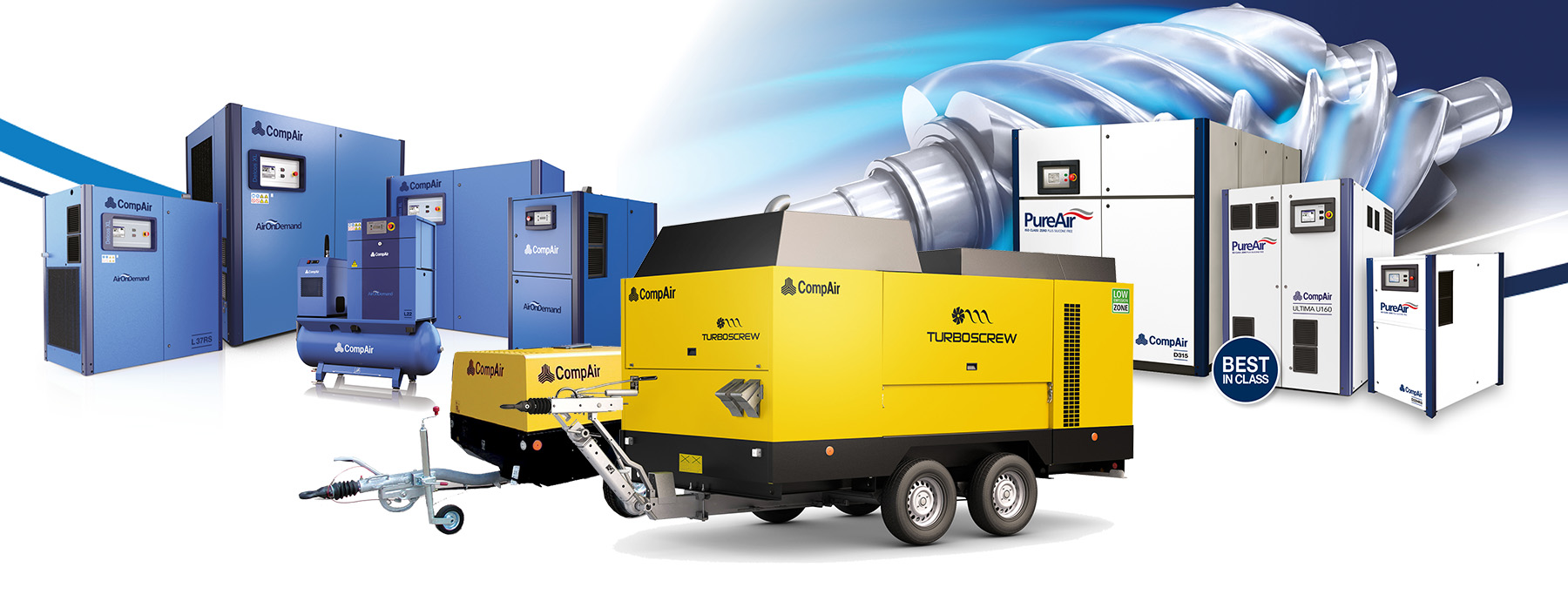Choose a different country or region to see the content specific to your location
Select Your Country/Region
Current Region:
 Global (EN)
Global (EN)
How can we help you?
CompAir is a leading manufacturer of a wide range of industrial air compressors designed using the latest advances in reciprocating, rotary screw, centrifugal, and portable compressed air technology.
Engineered with the customer in mind, our industrial solutions are aimed at solving the common challenges posed by your industry. Our product offering is designed to suit a wide variety of industrial applications, helping to improve the efficiency, reliability, and performance of your operation.
We have a diverse range of air systems to choose from including oil lubricated, oil-free, single and variable speed drives, portables and more.
We are dedicated to providing the complete solution for our industry partners, that’s why our product offering includes a range of air treatment equipment and accessories. We provide a complete range of downstream equipment including dryers, filtration products, condensate treatment, nitrogen generators, heat recovery systems and management systems, to name a few. Each product is designed to enhance and optimise your installation, helping to achieve your business goals.
Please select a compressor range for more information:

When we speak of utilities, gas, water, and electricity are the first to come to mind. However, for professionals in the manufacturing industry, compressed air plays a vital part in almost all production processes. It is the backbone of many industrial applications and provides the necessary power to complete a range of jobs that are essential for many businesses.
For this reason, compressed air is considered by many in the industry as the fourth utility.
From the clean water that comes from the tap to the spray paint on your car, compressed air plays a major role in the modern world and is often the hidden source of power behind things that we rely on each day!
As compressed air systems play such an important role in many businesses, it is essential for owners to seek out opportunities to reduce energy and operating costs in relation to their compressed air production. In fact, energy makes up 70% of a compressor system’s total cost!
For this reason, choosing a compressor with the correct power, pressure, and capacity to suit your needs is essential in keeping costs low and reducing your carbon footprint. Read on for professional advice on choosing lubricated or oil-free, specifying a size, and selecting a technology.
Remember that CompAir engineering experts are here to support you in your purchasing decision, so feel free to contact us for advice and guidance!
There are different air purity classes that compressed air can fall into according to the International Organisation for Standardisation (IS0). It is important to consider if your business requires a specific class of air before you choose which type of compressor to purchase. Air compressors can be specified to meet with an ISO class to ensure the product meets your exact expectations.
Food and beverage industries, as well as pharmaceutical and chemical, will often require ISO Class 0 air quality. This is the cleanest standard of compressed air possible and requires extremely high levels of air purity.
If clean air is required for your application, an oil-free compressor will always be the most efficient choice. Although upfront costs may be more than a traditional lubricated compressor, you will benefit from the assurance of always being able to guarantee a clean output of contaminant and silicone-free air. All of CompAir’s oil free compressors are certified as either ISO Class 1 or ISO Class 0 air purity, offering our customers the cleanest solution.
If your compressed air installation will be for general use and not require Class 0 clean air, then a lubricated compressor will be the more economical choice for you. Lubricated compressors are extremely popular and are the most common type of compressor in use within industrial sectors. They are robust, reliable and high performing machines. Plus, downstream equipment such as filters and separators can be used to clean compressed air output effectively, removing contamination and providing clean air suitable for many purposes.

What size compressor do I need?
The next thing to consider is the size of the compressor. You should consider your individual air requirements and choose a size based on this. Choosing a compressor too small could cause issues when demand is high, resulting in problems with production. However, a compressor too large for your operation could lead to wasted energy and a higher cost of ownership.
It is also important to understand your flow and pressure requirements. You will need to purchase a machine that has enough pressure to achieve the performance you require for your application. You will need to consider the amount of compressed air flow (CFM) you will need at a specific pressure (PSI) in order for the application process to run smoothly. All of these factors will affect the size of the compressor you choose.
What type of compressor do I need?
There are many different types of compressor technology available from reciprocating piston compressors to rotary screw compressors. To choose a compressor technology type, you should again look at your demand. Consider how many hours a year you will require your compressor to operate, if you need a constant or intermittent supply of air, and if there is ever going to be a fluctuation in demand. All of these factors will affect which design of compressor you choose as each compressor has a unique set of features and benefits.
Still unsure? Conduct an air audit
If you are still unsure, you may consider asking a professional to conduct an air audit. This can help you to assess your air output demand and provide you with some insightful ways to improve the overall efficiency of your operation.
CompAir experts will be happy to help you find the ideal solution that matches your plant requirements. We will consider air demand, air quality, pressure, flow rates and any other factors that will affect your decision and provide you with professional tailored advice.
Selecting downstream equipment
A high performing compressed air system is much more than just an efficient compressor. Downstream equipment and accessories form an essential part of your installation, optimising and enhancing your operation.
CompAir offers an extensive line of air treatment accessories such as dryers, filters, condensate drains, nitrogen generators, heat recovery systems, and management systems. Our accessories complete your system and help to upgrade the performance of your installation.
Industrial air compressors are the work-horse behind many products and processes, some that you may not even realise! From food packaging and processing to coating tablets and spray painting cars, the uses of industrial compressed air are multifarious.
Some of the most common industries and applications where CompAir air compressors are used include:
Automotive
Used for car and engine assembly as well as to power AI robots and create clean finishes with spray paint.
Food, Beverage, and Brewing
Used during the production of brewed products as well as for food packing, processing, and transporting.
Chemical and Petrochemical
Used for handling hazardous materials as well a nitrogen generation and process air for direct contact with the product.
Manufacturing
Used widely within the industrial manufacturing industry for a variety of uses including air-operated tools and equipment, access lifts, and shot blasting, to name a few.
Electronics
Used for cleaning expensive electronic equipment such as PCB boards and also for pick and place machines.
Oil and Gas
Common applications include petroleum refining, petrochemical synthesis, pipeline transportation and gas injection.
Marine and Military
Compressed air provides power for many ship functions in marine applications and is sometimes used for simulators and shooting range targets in the military.
Medical and Dental
A variety of applications require compressed air within the medical and dental industry including respiratory equipment, powering surgical or dental equipment, and sterilization.
Pharmaceutical
The pharmaceutical industry relies on compressed air for packaging and sealing medication, fluid pumps to move liquid products, and air knives which can be used to cut products.
Textiles
Compressed air can be used in the process of making high-quality materials during jet weaving, spinning, texturising, and dyeing.
CompAir has invested 16 million euros in the Simmern "Centre of Excellence" plant in Germany, where its industrial air compressors are manufactured.
(For a more detailed video about how air ends work please click here to the airends video on our oil-free page)